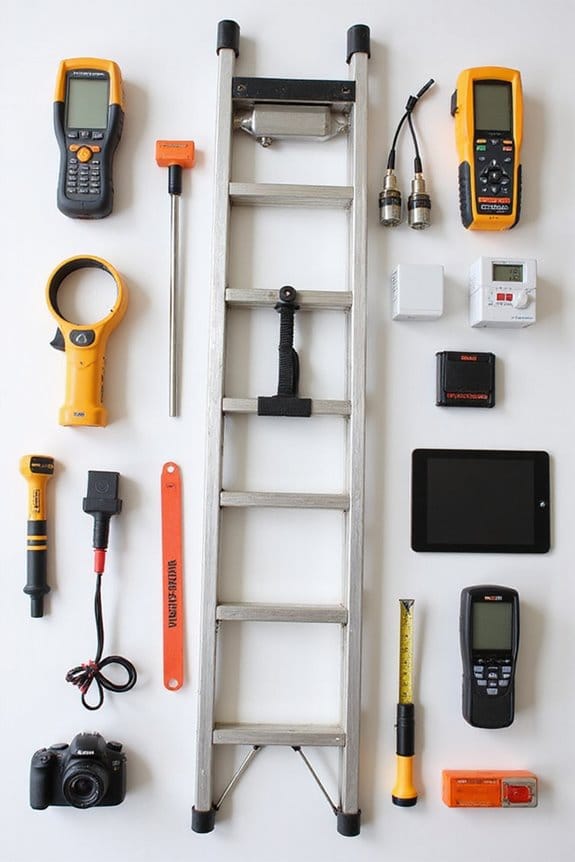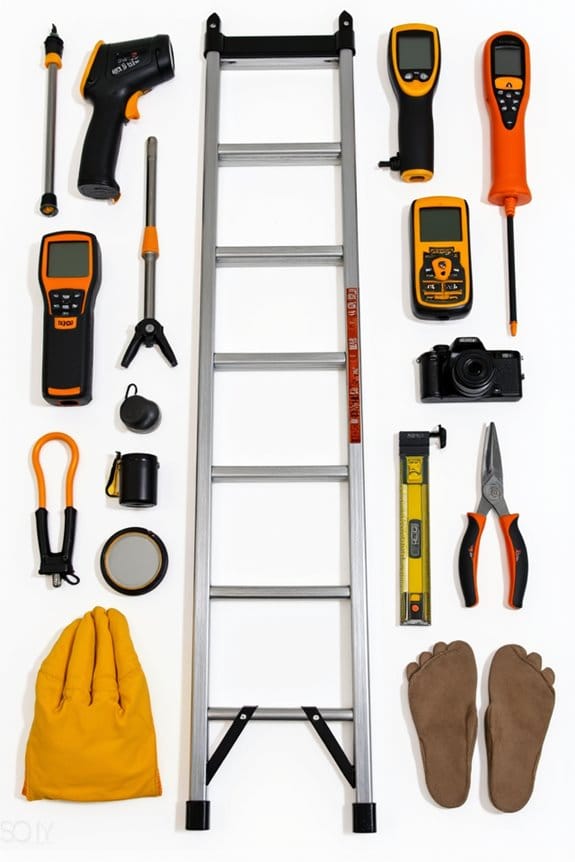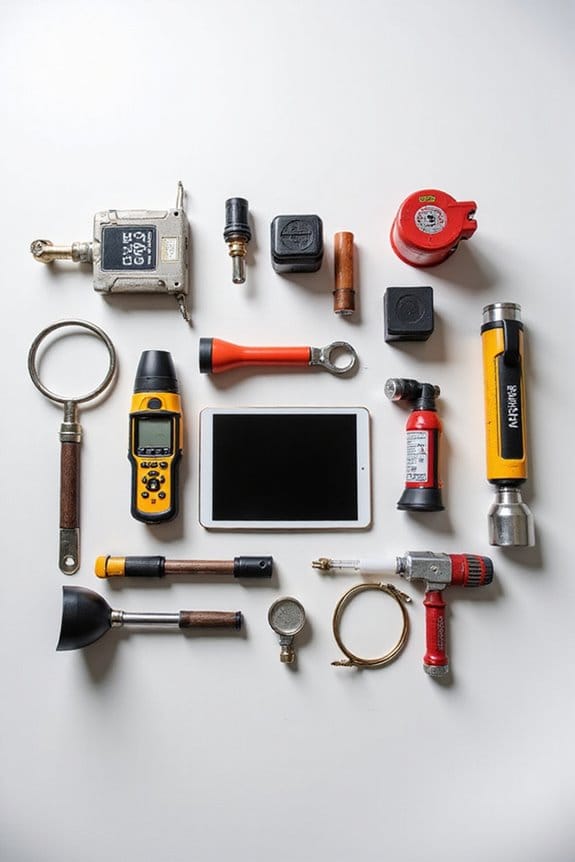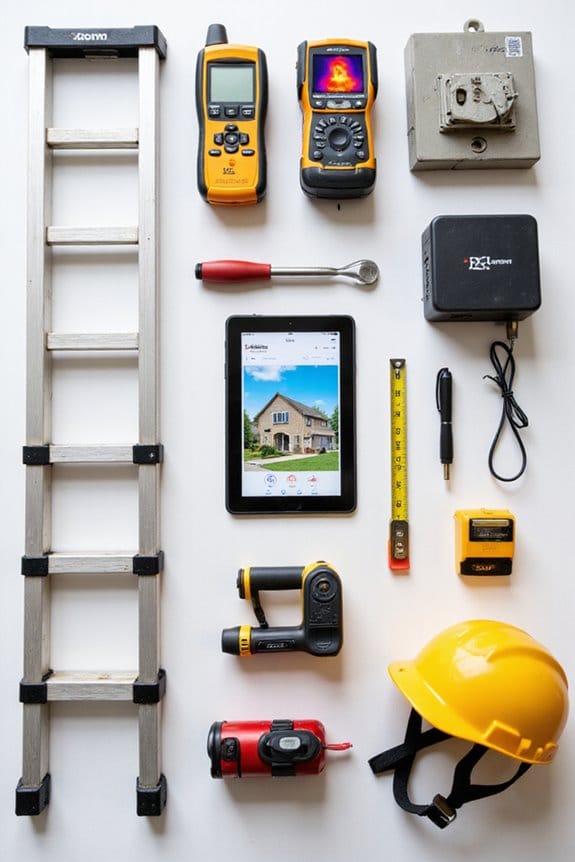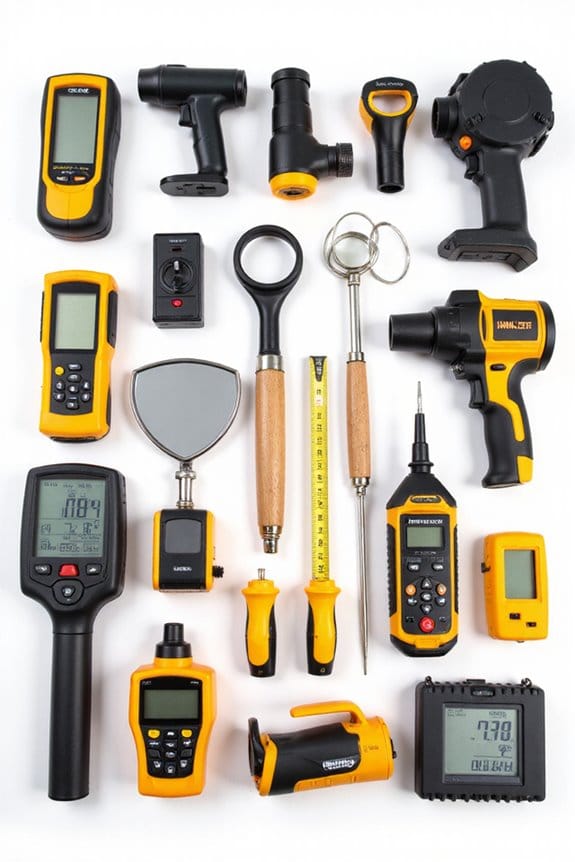Inspection reports can vary quite a bit in validity. For example, vehicle inspection reports might last one to two years depending on your state, while home inspection reports are usually good for about 90 days. Some commercial vehicle inspections require records to be kept for three to 14 months, depending on the type of report. It’s essential to know these timelines—expired reports can create headaches. Stick around, and I’ll share more about compliance and best practices!
Key Takeaways
- Vehicle inspection validity varies by state, with New Jersey requiring inspections every two years and Pennsylvania annually.
- Home inspection reports are generally valid for about 90 days, as conditions can change rapidly.
- Commercial vehicle DVIRs must be retained for at least three months, while periodic inspection reports are valid for 14 months.
- Federal regulations do not define a specific time limit for home inspection reports, but lenders may require recent evaluations for financing.
- Expired inspection reports can complicate legal standing in transactions and may affect insurance claims and coverage.
Understanding Vehicle Inspection Report Validity
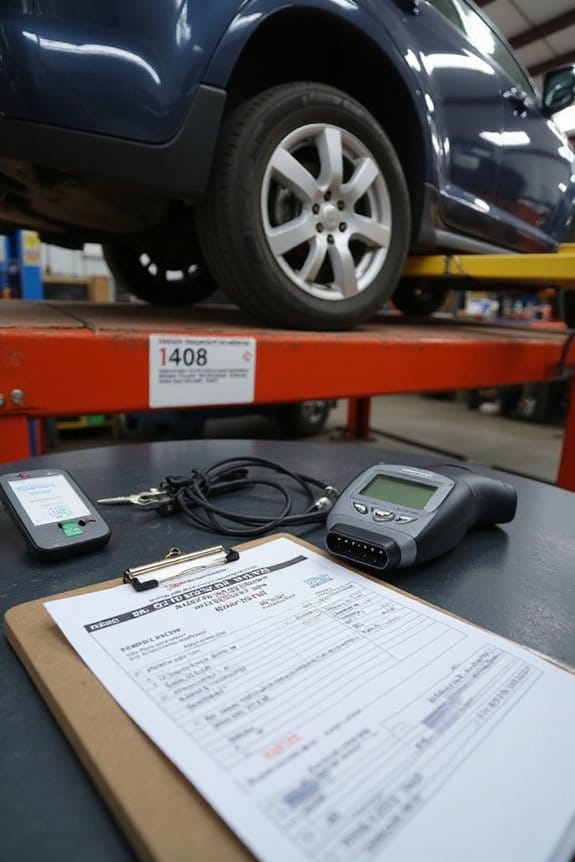
When it comes to understanding vehicle inspection report validity, it’s essential to know that the rules can vary widely from state to state. Here’s a quick rundown to keep you in the loop:
- New Jersey: Inspections every two years, except for new vehicles after five years.
- New York: Stickers are valid until the last day of the month punched, usually 12 months.
- Delaware: Inspect up to 90 days before registration expiration.
- Pennsylvania: Most vehicles have a one-year validity.
Keeping track of inspection validity is vital for vehicle compliance. Expired stickers can lead to annoying fines or even parking tickets! So, stay on top of your inspections, or you might find yourself in a bit of a pickle.
Retention Periods for Commercial Vehicle Inspections
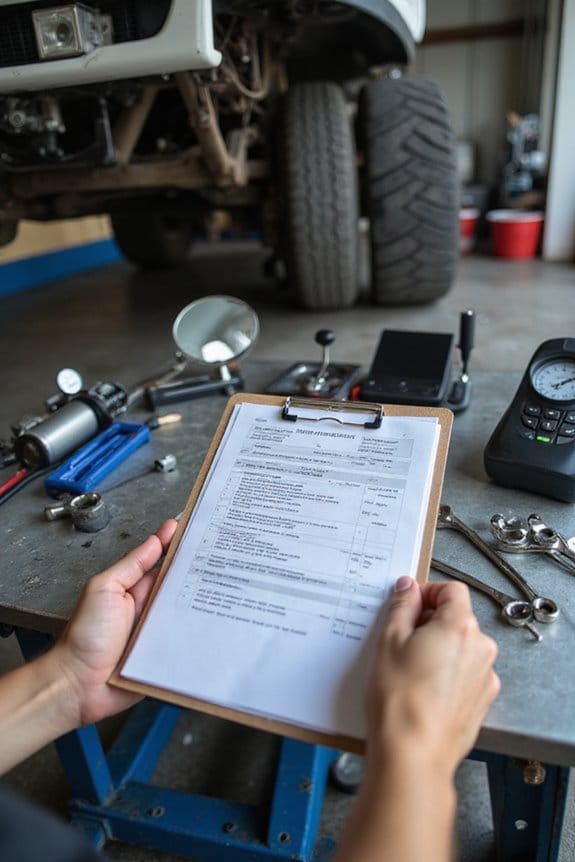
Keeping track of vehicle inspections doesn’t just apply to personal cars; it’s equally important for commercial vehicles. Here’s a quick breakdown of retention requirements for inspection documentation:
- Driver Vehicle Inspection Reports (DVIR): Keep originals for at least three months. If defects are found, submit reports after each trip.
- Periodic Inspection Reports: Store these for 14 months. You must have the most recent report on the vehicle at all times.
- Certification: Before dispatching a vehicle, verify all noted defects are repaired and certified.
Home Inspection Report Validity Explained
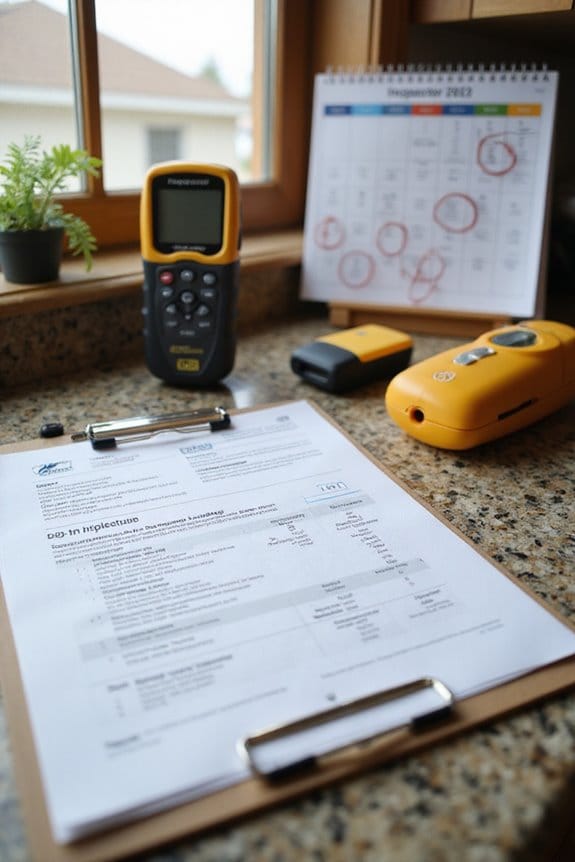
Understanding the validity of home inspection reports can save you from potential headaches down the line. Typically, these reports are valid for about 90 days. Here’s why that matters:
- Inspection Report Accuracy: The moment the inspector leaves, things can change. New damage from weather or renovations could invalidate previous findings.
- Buyer Inspection Responsibilities: If closing gets delayed, consider a re-inspection. Mortgage lenders often want a recent report to guarantee you’re not walking into unexpected repairs.
Federal Regulations on Inspection Reports
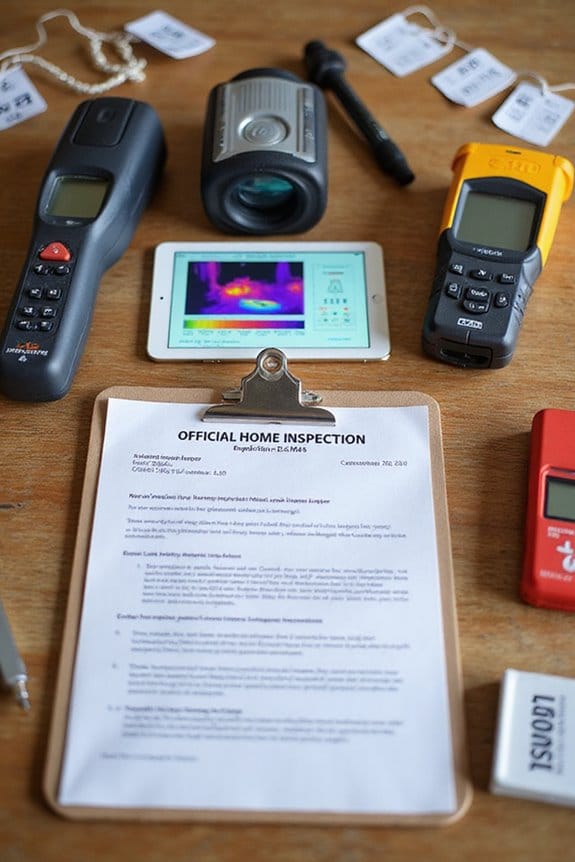
While federal regulations don’t set specific time limits for home inspection report validity, it’s important to grasp how these rules shape what you can expect. Here’s what you need to know:
- No Fixed Duration: Federal standards don’t define how long reports are valid, which can be a bit tricky.
- Inspection Accuracy: Reports reflect conditions only at the time of inspection. Changes after that can affect their reliability.
- Lending Institutions: Sometimes, federal standards influence inspections indirectly through requirements set by lenders.
- Liability Concerns: Inspectors often limit their liability, meaning reports are only accurate while they’re on-site.
State-Specific Rules for Inspection Duration
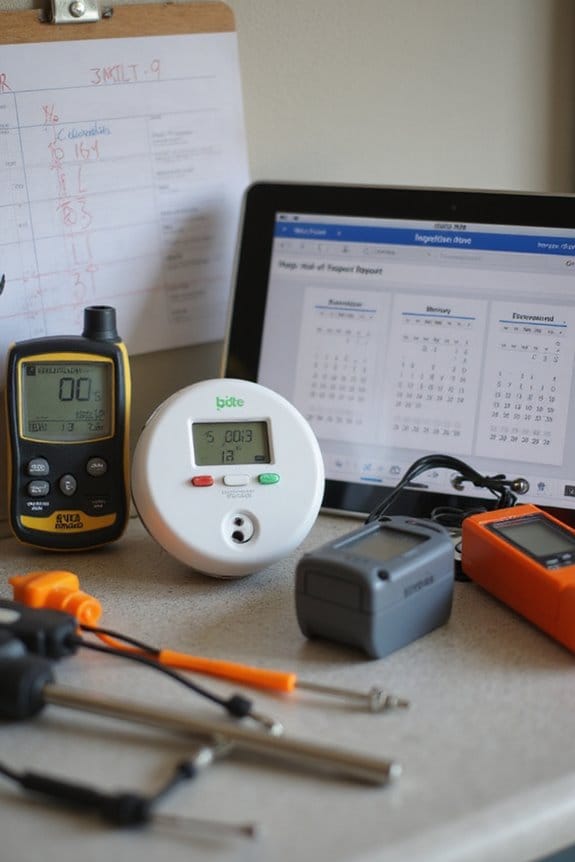
When it comes to state-specific rules for inspection duration, knowing the ins and outs can save you a lot of headaches later on. Here are some key points to keep in mind:
- State Regulations: Each state has its own rules. For example, in Minnesota, an inspection report is valid for 14 months, while a vehicle inspection decal is good for 12 months from the printed date.
- Inspection Criteria: Commercial vehicles over 26,000 pounds require annual inspections. Some states also allow certificates of compliance from federal inspections.
- Retention: Keep your inspection reports handy for verification. They’re often required during vehicle operation.
Practical Timeframes for Vehicle Inspections
Getting your vehicle inspected isn’t just a chore; it’s an essential part of keeping it safe and roadworthy. Here’s a quick rundown on inspection frequency based on vehicle types:
- Commercial Vehicles: These must be inspected annually, with reports held for 14 months. If there’s a defect, fix it before hitting the road again.
- Passenger Vehicles: In New Jersey, inspections happen every two years, while New York demands them yearly.
- Special Cases: Newer vehicles or those older than 25 years might have different requirements.
Importance of Timely Inspection and Renewals
Maintaining your vehicle’s inspection schedule is about more than just ticking a box; it’s about ensuring your safety and that of others on the road. Here’s why timely inspections and inspection renewals matter:
- Safety First: Regular inspections help identify potential issues before they become serious problems.
- Legal Validity: Expired reports can lose their legal standing, complicating transactions or insurance claims.
- Negotiation Power: Waiting too long to address findings can weaken your position in negotiations.
- Insurance Requirements: Many insurers won’t accept older reports, meaning you might need a new inspection.
Impact of Weather and Home Changes on Inspection Reports
While it might seem like your inspection report is set in stone, weather events and changes to your home can quickly throw a wrench in that idea. Here are a few things to keep in mind:
- Weather Effects: Severe weather like flooding or wildfires can cause new damage, making your report outdated. Even minor changes can affect structural integrity or systems.
- Renovation Impacts: If you’ve made extensive renovations, the original report may no longer be reliable. Any changes to wiring or plumbing require a fresh inspection.
To guarantee you’re protected, consider scheduling inspections close to your closing date. And if a storm rolls through, don’t hesitate to get a re-inspection. After all, it’s better to be safe than sorry!
Compliance and Liability in Inspection Reporting
When it comes to home inspections, understanding compliance and liability is just as important as knowing how weather and renovations can impact your report. Here’s what you should know:
- Compliance Standards: Your inspection report must accurately reflect the home’s condition at the time of inspection. This isn’t just a suggestion; it’s a requirement.
- Liability Risks: If someone uses a report past its valid timeframe without a disclaimer, inspectors can be held liable for any new issues that arise.
- Timely Delivery: It’s essential to deliver reports promptly to keep everyone informed before closing.
Always remember, as conditions change, so does the accuracy of your report. So, don’t be surprised if you need a new inspection down the line!
Best Practices for Scheduling Inspections
Scheduling inspections can feel like juggling flaming torches, but with the right approach, it doesn’t have to be a circus act! Here are my top best practices:
- Master Checklist: Compile a list of required inspections and their frequencies. It’s a game-changer.
- Asset Inventory: Use asset management tools to track what needs inspecting. Prioritize by risk—high-risk assets deserve more attention.
- Coordinate Early: Work with contractors ahead of time to avoid scheduling conflicts, especially during busy seasons.
- Flexibility is Key: Be ready to adjust for weather or other unexpected factors.
- Relationships Matter: Build rapport with inspectors to streamline the process.
With these tips, you’ll make inspection scheduling a breeze instead of a juggling act!
Frequently Asked Questions
Can I Use an Expired Inspection Report for Warranty Claims?
Think of an expired inspection report like a wilted flower; it loses value. I can’t use it for warranty claims without fresh insight. Warranty claim processes often require current reports to validate any issues that arise.
What Happens if I Miss the Inspection Renewal Deadline?
If I miss the inspection renewal deadline, I face missed deadline consequences like fines and the inspection report becoming invalid. It’s essential to act quickly to avoid potential penalties and insurance issues.
Are Inspection Reports Transferable Between Owners?
Oh sure, let’s just pass inspection reports like potato salad at a picnic! In reality, inspection report validity doesn’t guarantee owner transferability; sellers must disclose them, but each state has its own quirky rules.
How Do I Contest an Inspection Report Finding?
To contest an inspection report finding, I’d start the dispute process by identifying inaccuracies. I’d gather evidence supporting my claims, ensuring the report’s accuracy is challenged effectively, and submit my appeal promptly for consideration.
Can I Perform My Own Vehicle Inspections Legally?
I can’t legally perform my own vehicle inspections due to vehicle inspection legality regulations. I’ve learned there are strict self-inspection guidelines, and only certified professionals are allowed to guarantee compliance with safety and emissions standards.

